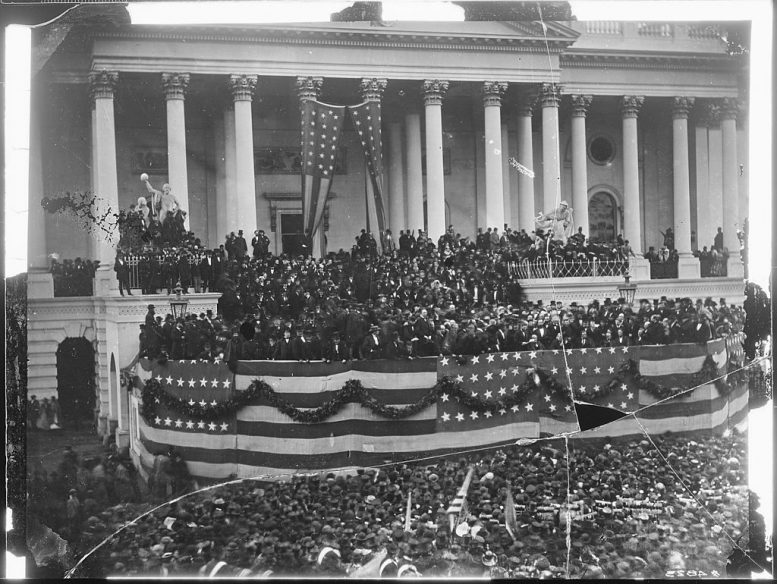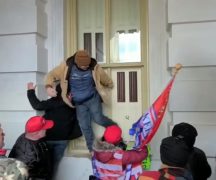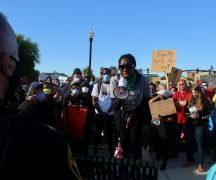A controversial transfer of power. Traditions going by the wayside. A divided country on edge.
Much about the 1869 inauguration of Ulysses S. Grant, the first Ohio-born politician to become president, resembles the year 2021. Americans closely followed the melodrama surrounding the transition from President Andrew Johnson to President-elect Grant, with newspapers around the country reporting near-daily updates.
It culminated in an inauguration which bucked several ceremonial customs and remains one of the more unusual presidential transitions in American history.

Photo courtesy Wikimedia Commons.
Grant and Johnson had been political adversaries for years. Their rivalry was heightened in 1868 when Grant favored the impeachment effort against Johnson.
Back then, presidential inaugurations were held in March, a full four months after Election Day. The first sign of controversy came on the first day of 1869. It was tradition that the president-elect visited the White House on New Year’s Day to begin the peaceful transition.
Grant opted not to make the visit, taking a trip to Philadelphia instead.
The Cincinnati Enquirer, which reported extensively on Grant due to his Southwest Ohio ties, said this act of leaving town “shows us the General in rather an unfavorable light.”
“We venture to say, that if he had not run away, and had called upon the President, that the latter would have treated him with a courtesy (Grant) seems utterly unable to appreciate,” the Enquirer added.
This “coolness” between the two men, as newspapers called it, began to snowball. In January, Grant said he would not take the traditional carriage ride with Johnson on the way to the U.S. Capitol.
“This incident, trifling as it may appear, affords, nevertheless, a clue to the character of General Grant, and shows him to be capable of those majestic flights of littleness,” the Enquirer reacted.
The Inauguration Ball would prove to be the biggest source of controversy. First there was the issue of where to have it; the U.S. Senate voted against allowing any Grant parties inside the Capitol building.
Then there was news Grant did not plan to invite Johnson to attend the parties. People wondered if the incoming Republican president would allow any Democrats to attend.
But the biggest concern among white elites involved the question of Black attendees.
Advertisements said the ball was “open to well-behaved and well-dressed people, who may feel themselves able and willing to pay the initiation fee.” Tickets cost $10 and each allowed in one man and two accompanying women.
Ohio newspapers were split on the issue of allowing Black revelers, with publications in the larger cities generally in favor and others in rural areas printing racist screeds.
If Black Americans were good enough to vote and to serve in the Union Army, publications reasoned, shouldn’t they be good enough to attend inauguration festivities?
In late January, the Enquirer reported that Grant was considering doing away with the Inauguration Ball entirely. Newspapers interpreted this as the president-elect wishing to avoid conflict rather than alienate those who still fought against Black rights following the Civil War’s conclusion.
“The course pursued by General Grant in dodging this issue,” one outlet wrote, “was certainly neither bold nor manly!”
Mayor Sayles J. Bowen of Washington D.C. put the issue to rest in February. Bowen was chairman of the organizing committee and announced that all respectable people, “without distinction of color,” would be allowed to buy tickets.
Johnson ended up declining to participate with the inauguration ceremonies in any way. Grant traveled alone to the Capitol, where he gave the traditional oath of office and inaugural speech.
The Enquirer reported that nobody in attendance could hear the speech except for those very close to the platform. Important points of the address were passed throughout the crowd by word of mouth. Grant asked the nation for patience as the United States continued to chart a path after the war. He also pledged support for “proper treatment” of Native Americans and for suffrage rights of Black citizens.
The Inauguration Ball was held in a new wing of the Treasury Department building. Described as “non-official festivities,” a large crowd nevertheless gathered in four separate ballrooms — one above the other on different floors. The ballrooms were connected by telegraph so that the master of ceremonies could start the dancing at the same instant on each floor.
“The attendance numbered over two thousand persons, and included representatives of all classes and conditions of society,” it was reported. “The crush was so great that it was quite impossible at times to do much dancing.”
Grant arrived at around 10:30 p.m., with the presidential party taken to a private room set apart from the massive crowd. Soon this room filled up with friends and members of the diplomatic corps.
“There was no comfort anywhere in the building,” a newspaper wrote, “and many were glad to escape the pressure.”
While Johnson’s decision to skip the inauguration was considered by many to be in bad taste, some took no issue with it.
In fact, The Gallipolis Journal was glad: “It is better so than it was four years ago, when he disgraced his office and his country, by presenting himself drunk at the inauguration ceremony. He is too low to disgrace anybody now, even himself.”
The theme of the day was peace, as highlighted in the inauguration ode from J.M. Winchell, which concluded with these lines:
“There, from New England’s busy mills;
From where the Mississippi flows;
From where the bursting cotton fills
The golden air with mimic snows;
From where the gleaming nuggets shine
Close neighbors of the fruitful vine–
They will not cease;
The countless voices raised to greet
The soldier in the ruler’s seat,
This chorus ever to repeat,
‘Let us have Peace!’”





